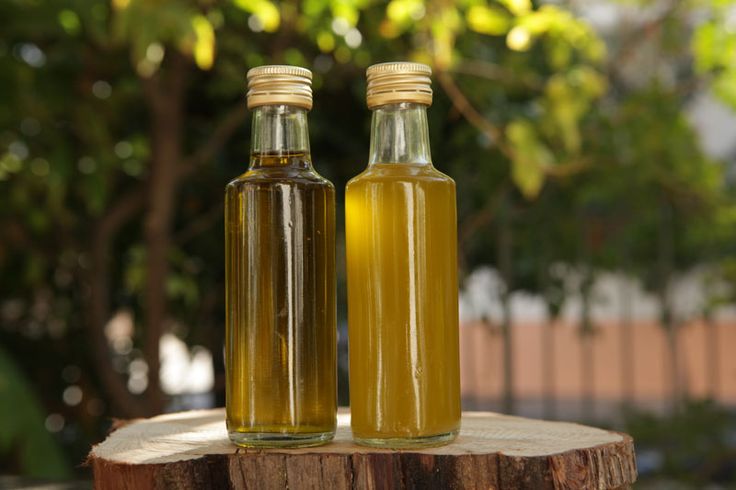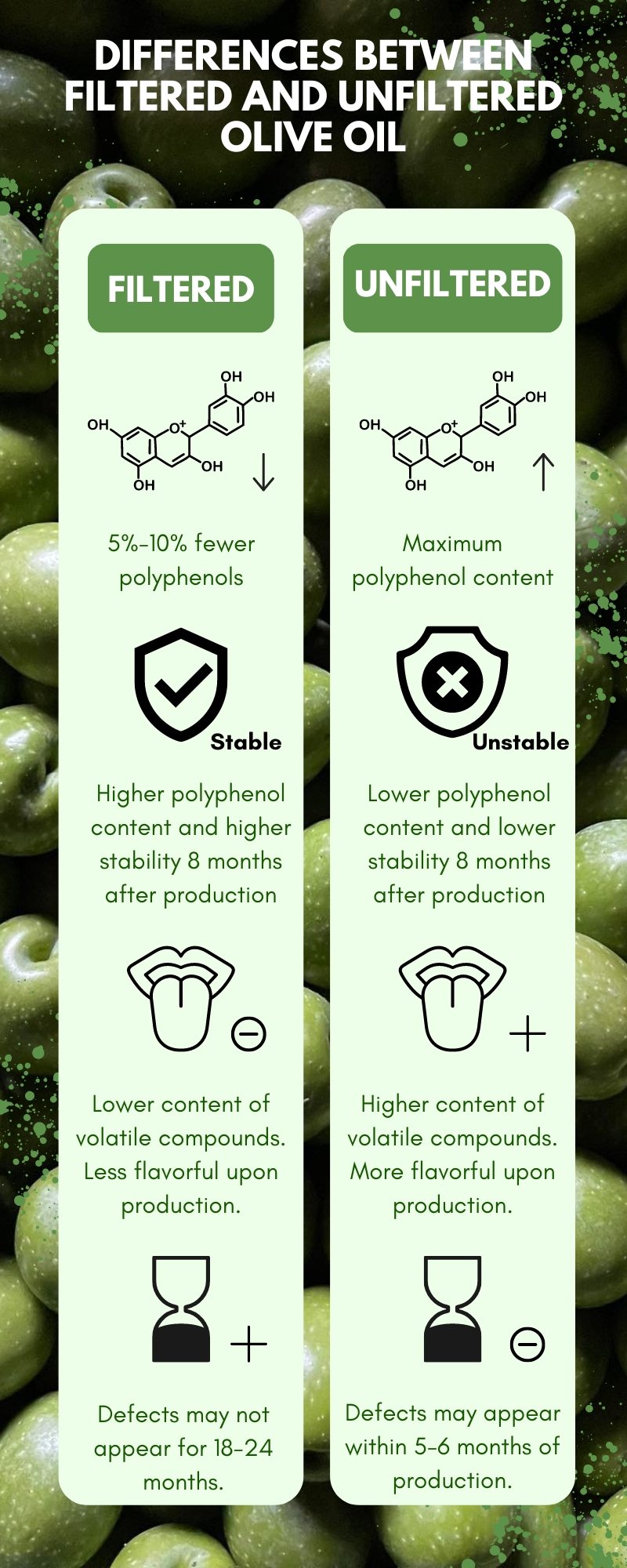Uncovering the Truth About Unfiltered Olive Oil: What You Need to Know
Lazy? Quick Read.
Key takeaways on the best ways to enjoy unfiltered olive oil.
1. Unfiltered is the type of olive oil that has not been filtered after production.
2. After production, tiny solid parts of olive pulp and other parts of the olive fruit can be found in the olive oil.
3. This sediment and humidity add to the cloudy appearance of the olive oil.
4. Although these tiny solid parts add to the flavor and health benefits of the olive oil, they also destabilize the olive oil’s structure.
5. This leads to a very fast degradation of the product. Unfiltered olive oil may become defective within 5-6 months of production.
6. As a result, unfiltered olive oil is a seasonal product. You should only consume it fresh, from October to May at the latest.
7. This makes sourcing unfiltered olive oil difficult. Many grocery stores sell unfiltered olive oils that have best before dates way ahead in the future. But there is a way to enjoy unfiltered EVOO!
8. Our family makes a small batch of unfiltered Myrolion every season and we dispatch it right after production. Contact us to book your unfiltered EVOO today.

Author: Athanasios Demeslis
Producer of Myrolion
This article has been meticulously prepared by Athanasios to help you identify the ways to best enjoy unfiltered olive oil, for you and your loved ones.
Athanasios has years of experience with olive farming, olive oil extraction, and sensory evaluation of olive oil.
Intro to Unfiltered EVOO
There’s something about unfiltered olive oil that just feels more real, more authentic. The term unfiltered makes you feel that the product is more natural and pure. Its rich, cloudy texture and intense flavor seem to speak of ancient methods and old-world craftsmanship, of careful attention to detail and a deep respect for tradition.
But what is unfiltered olive oil? Why do some producers choose this method, and what are the benefits (and potential drawbacks) of using unfiltered oil in your cooking and eating? And perhaps most importantly of all, where can you find the best unfiltered olive oil in today’s crowded and confusing market? Is unfiltered olive oil better than filtered ones?
The answers to these questions are pretty simple and straightforward. So come with us as we dive into the world of unfiltered olive oil, exploring the joys and challenges of this ancient and fascinating culinary tradition.
Generally, unfiltered olive oil has more polyphenols and volatile compounds which are believed to have a variety of health benefits and offer a superior taste. But there’s a catch. Despite its superior health benefits and aromas, unfiltered olive oil has a much shorter shelf life than filtered ones. This makes it difficult to enjoy real extra virgin olive oil.
But still, with the right storage techniques or purchase timing, unfiltered olive oil can be a great addition to your meals. So, how can you tell if the olive oil you’ve got in your pantry is unfiltered or not? The answer is simple.
Just look for the murky and cloudy texture of the oil that comes from the sediments that haven’t settled yet. Now that you know the truth about olive oil, it’s time to take control of what you consume and make informed choices.
How is Unfiltered Olive Oil Related to Other Types of Olive Oil?
Olive oil has three distinct quality grades in the market:
- Extra virgin olive oil
It has been produced directly from olives and only through mechanical means. It has maximum chemical stability. Its taste is at least a bit fruity and it does not have any sensory defects. - Virgin olive oil
It has also been produced directly from olives and only through mechanical means. Its chemical stability is lower and it may have light sensory defects. - Olive oil
It is a mix of olive oils that have been refined through high heat or chemical means. This is done to olive oils that have severe defects. It is a way for defective olive oils to reenter the market as a cheaper alternative.
All of these types of olive oil can be certified organic or conventional. You can view the importance of organic olive oil here.
Some extra virgin olive oils can be cold pressed or cold extracted. These olive oils have been produced at a low temperature to maintain natural antioxidants and flavor. Cold pressed olive oils should normally be rich in polyphenols. Polyphenol-rich olive oil is the type of cold pressed extra virgin olive oil that has been certified to bear a health claim thanks to its increased polyphenol content.
All of these grades and types of olive oil can be filtered or unfiltered. It is important to remember that the term filtered has nothing to do with refined. Refined olive oil is chemically treated.
Definition of Unfiltered Olive Oil
If you’re a fan of olive oil, you must be aware of the buzz surrounding unfiltered olive oil. Is it the latest culinary trend, or just a passing fad? As it turns out, unfiltered olive oil is not a new thing.
In fact, it’s the way olive oil was made for centuries. However, with the advent of modern food processing and distribution, the practice of filtering olive oil became more popular. This filtering process involves the removal of any solid particles or debris that may have been present in the oil, resulting in a clear and smooth liquid. The removal of solid particles is mechanical, there are no chemical agents used in the filtration of olive oil. The most typical method of olive oil filtration is through the use of paper filters.
Unfiltered olive oil has a cloudy appearance, and it may cause some people to be hesitant about using it. However, it’s worth noting that the sediment actually contains many of the beneficial nutrients found in olives, including polyphenols, which are known for their antioxidant properties. However, it also contains humidity and olive particles that will start fermenting fast.
So, why and when to choose unfiltered over filtered?
Pros and Cons of Unfiltered Olive Oil
Pros
- Slightly higher content of polyphenols
- Slightly richer flavors and aroma
Cons
- Much shorter shelf life due to fermenting particles and increased humidity
- Typically unfiltered olive oils that can be found in retail stores have sensory defects even before purchase.
So, the question is not whether to buy unfiltered EVOO or filtered EVOO, but where to source it from and when to buy it.
What’s the Differences Between Filtered and Unfiltered Olive Oil?
The info-graphic below will break down the differences between unfiltered olive oil and filtered olive oil.
As you can see, filtered olive oil is the tortoise and unfiltered olive oil is the hare. Unfiltered EVOO starts off stronger with more polyphenols, increased bitterness and a strong peppery finish, but in the long run you’ll receive the highest value from filtered EVOO as it will maintain all of these features for longer. This happens because the increased humidity and olive fruit particles that remain in the unfiltered version create an unstable environment that causes faster fermentation and degradation. Polyphenols reduce, acidity increases, and soon enough the first defects appear.
This is a general approach. There are numerous filtration methods and they affect olive oil attributes in various ways. But generally speaking, you can enjoy both types of EVOO at the right time of the year.
So, is unfiltered olive oil better? In the short run, yes. But the risk of the olive oil degrading fast is very high too.
Unfiltered olive oil is strictly a seasonal product. If your unfiltered olive oil is produced in the northern hemisphere then you should only consume it fresh, up to 6 months from production. So, you should not consume fresh unfiltered olive oil after May. And don’t even bother trying unfiltered EVOO from a previous season, as it is common in grocery stores, because it will be a defect party.
Common Misconceptions
When it comes to olive oil purity, there are numerous misconceptions that need to be cleared up. One of the most common of these is the idea that filtered olive oil is somehow “less pure” than unfiltered.
This is simply not true – in fact, filtering is an important part of ensuring that your olive oil is free from impurities and contaminants that can affect its taste, aroma, and nutritional value.
On the other hand, some consumers are naturally hesitant to try cloudy olive oil. It might look dirty or unsafe. However, the more cloudy your unfiltered EVOO, the more likely it is that it was not overheated during the process of decanting. So, it probably preserves all the healthy and flavorful stuff.
Another common myth is that you can tell whether an olive oil is pure by looking at its viscosity. While it’s true that a good-quality olive oil should be thick and rich, viscosity is not a reliable indicator of purity. Filtered olive oils are transparent, yet they can be astonishing.
Instead, it’s important to look for other signs of quality, such as a fruity aroma, a slightly bitter taste, and a burning sensation at the finish. Ultimately, the best way to ensure that your olive oil is pure and of high quality is to know where you source it from.
How to Store Unfiltered Olive Oil
So, if you want to get the most out of your unfiltered olive oil, listen up! First and foremost, avoid exposing it to direct sunlight or any other heat sources – this can cause it to oxidize and become rancid. Instead, keep it stored in a cool and dark place, like a pantry or cupboard.
If you live in a place like Florida or California, like many of our customers, you may need to store your olive oil, filtered or not, in the fridge during the hot summer months. Just keep it away from the cooling source to avoid freezing.
Finally, make sure to use your unfiltered EVOO within 2 months from opening. Trust us, there’s nothing worse than the taste of rancid oil in your cooking. So, go ahead and add unfiltered olive oil to your culinary arsenal, but just make sure to store it and use it properly for maximum enjoyment.
Where to Buy Unfiltered Olive Oil
Right here.
Myrolion is strictly filtered. Every year we only sell fresh olive oil that is produced during the harvest from October to November. We filter it to keep it fresh until the next batch is ready. This way our customers receive fresh olive oil from us throughout the year.
BUT, we know there are quite a few people out there who understand that unfiltered olive oil is seasonal, and they are willing to adapt to that, so they may acquire optimal benefits from their use of olive oil.
For this reason, I encourage you to send me an email at [email protected] and let me know that you want some bottles of unfiltered Myrolion next season. I will save your information and I will send you an email in November to remind you that I am ready to send you our family’s fresh unfiltered EVOO. Just remember that we have a fixed quota of unfiltered bottles every season. So, the sooner you let me know the more likely I’ll have enough for you by November.
Until then, say hi to our family!
Enjoy Cold Pressed Extra Virgin Olive Oil Responsibly
In a world where the quest for “clean” eating has become almost a religion, there are few culinary indulgences that stubbornly remain unshakable in their earthiness and unpredictability: unfiltered olive oil. While many of us have come to equate food quality with laser-focused transparency and sanitized perfection, unfiltered olive oil boldly challenges that notion with its brash, unapologetic embrace of impurities, cloudiness, and sediments.
It’s a reminder that sometimes, the most alluring and satisfying things in life are the ones that resist conformity and embrace their own distinctiveness. So go ahead, take a sip of unfiltered olive oil and let the untamed flavors take you on a wild, exhilarating ride through the rugged terrain of taste. Just remember, November to May!




